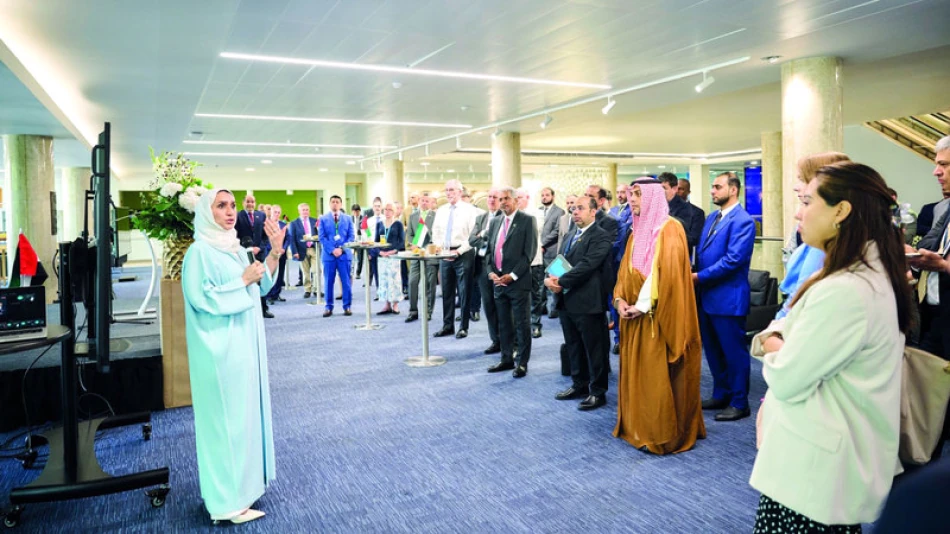
UAE Streamlines Maritime Shipping, Eliminates Bureaucracy for Seamless Operations
UAE Showcases Maritime Bureaucracy Revolution at International Maritime Summit
The United Arab Emirates has positioned itself as a global leader in maritime service efficiency by presenting its groundbreaking "Zero Bureaucracy" initiative to the International Maritime Organization's 134th Council session in London. This comprehensive program represents a fundamental shift in how governments can streamline maritime operations while maintaining regulatory standards, potentially setting a new benchmark for ports worldwide.
Redefining Maritime Service Delivery
The UAE's Ministry of Energy and Infrastructure unveiled details of its ambitious bureaucracy elimination program, which focuses on redesigning maritime services to be more integrated, seamless, and flexible. The initiative centers on reducing procedural steps, accelerating completion times, and enhancing user experience while eliminating redundant and unnecessary requirements.
This human-centric approach to service design places customers at the heart of the redesign process, leveraging accumulated knowledge, global best practices, and digital innovations to create a more efficient maritime ecosystem.
Key Program Elements
The zero bureaucracy framework encompasses several critical components that distinguish it from traditional regulatory approaches. The program eliminates unnecessary transactions, simplifies procedural pathways, and accelerates completion times through advanced digital solutions that ensure smoother, higher-quality user experiences.
Strategic Implications for Global Maritime Trade
This initiative arrives at a crucial time for global maritime trade, as supply chain disruptions and increasing cargo volumes demand more efficient port operations. The UAE's approach could influence how other major maritime hubs like Singapore, Rotterdam, and Los Angeles approach regulatory efficiency.
Hessa Al Malik, Maritime Transport Advisor to the Minister of Energy and Infrastructure, emphasized that zero bureaucracy represents an integrated governmental approach based on re-engineering services from a human perspective, utilizing accumulated knowledge and global best practices alongside digital innovations.
Competitive Advantage in Regional Context
The UAE's maritime sector faces intense regional competition from Saudi Arabia's expanding port infrastructure and Qatar's growing logistics ambitions. By eliminating bureaucratic friction, the Emirates aims to maintain its position as the region's premier maritime gateway, particularly as trade routes through the Middle East continue expanding.
Implementation and Future Outlook
Layla Al Balushi, Director of Strategy and Future at the Ministry of Energy and Infrastructure, noted that the ministry is moving steadily according to UAE government directives toward establishing a pioneering governmental model characterized by efficiency and flexibility. The maritime sector's bureaucracy elimination embodies this ambitious direction, targeting procedural redesign that meets future requirements.
Multi-Stakeholder Collaboration
The UAE delegation to London included representatives from multiple key entities: the Ministry of Foreign Affairs and International Cooperation, the Federal Authority for Identity, Citizenship, Customs and Port Security, and all major UAE ports including Abu Dhabi, Sharjah, Fujairah, Ajman, and Ras Al Khaimah ports, plus the Abu Dhabi National Oil Company (ADNOC).
This comprehensive representation demonstrates the program's scope and the government's commitment to systemic transformation across all maritime touchpoints.
Market Impact and Investment Implications
For maritime investors and shipping companies, the UAE's bureaucracy reduction could translate into significant cost savings and faster turnaround times. This efficiency gain becomes particularly valuable as global shipping rates remain volatile and port congestion continues affecting supply chains worldwide.
The initiative also signals the UAE's broader strategy to leverage technology and process optimization to maintain competitive advantages in an increasingly crowded regional market, potentially attracting more international shipping lines to establish regional headquarters in the Emirates.
Most Viewed News

 Sara Khaled
Sara Khaled






